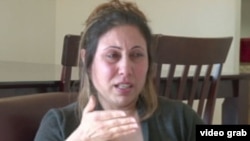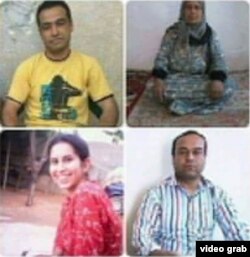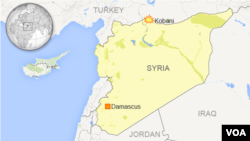Nayla Mohammed was sitting in her suburban Washington apartment last year when she learned that a group of Islamic State (IS) militants went on a killing rampage in her hometown of Kobani in northern Syria.
“I read on Facebook that a group of Daesh (IS) had entered Kobani, killing civilians,” said Mohammed, who came to America from Lebanon five years ago.
“I called my sister right away to check if they were okay, but there was no answer,” she told VOA. “So I called my other sister who lives in Turkey as a refugee. She told me that my family had been slaughtered.”
Mohammed lost nine members of her family in the IS attack in June 2015. She said she knew at least 50 others who were killed in her family’s neighborhood.
Some of the victims were murdered with knives, but, Mohammed, 36, said her family members were killed by gunfire as IS gunmen entered their house.
Details of the IS rampage have been verified by human rights groups and Kurdish officials.
“My sister and her children were all hit in the head,” said Mohammed. “They had no chance to survive.”
Tragic loss, mourning
As Syria’s civil war rages on, and the battle against IS continues in the Middle East, thousands of families across the world are grappling with the deaths of loved ones at the hands of IS militants.
The story of Mohammed’s family typifies a wide suffering, according to human rights groups.
A lack of psychiatric assistance leaves Syrians suffering in silence, according to post-war trauma experts.
“It is [a] lifelong trauma,” said Zaher Sahloul, a physician with the Syrian American Medical Society, a U.S.-based group that assists Syrian refugees.
“Patients may continue to suffer from post-traumatic stress disorder for the rest of their lives,” he told VOA.
Kobani was a battlefront between Islamic State fighters and Kurdish forces for months in 2014.
With the help of U.S.-led coalition airstrikes, Kurdish forces retook the city from IS in January 2015. However, IS militants continued to launch attacks on the outskirts of the border town.
IS massacre
In June 2015, a group of IS fighters infiltrated the city. They killed at least 174 Kurdish civilians, according to the Syrian Observatory of Human Rights.
Despite being liberated from IS, many residents of Kobani who have been living in refugee camps in Turkey are afraid of returning home. There is no guarantee that IS will not carry out attacks similar to that against Mohammed’s family, they said.
Like most Kobani residents, Mohammed’s family fled to Turkey when IS first attacked Kobani in September 2014. They went back a few months later when the fight was over, and they were told by Kurdish officials that IS was no longer a threat.
“I kept telling them not to go back, but they were convinced it would be safer for them,” Mohammed told VOA.
Months later, Kobani citizens fear returning home despite the hardships of life in refugee camps outside Syria.
“I would prefer to live in tents,” said Mustafa Ahmed, a 44-year-old Kobani resident who has been living in a Turkish refugee camp since October 2014.
“I don’t want to get killed there with my children in the house,” he told VOA in a telephone interview.
Devastated town
Kurdish officials say IS has been weakened and the group cannot launch large-scale attacks on Kobani anymore.
“Daesh is now 80 kilometers away from Kobani. It is extremely difficult for them to come near here,” Dijwar Kobani, a Kurdish YPG commander based in Kobani, told VOA.
He told VOA that even though the local government does not get much assistance from the international community, it is trying hard to rebuild the city.
Mohammed, however, believes the situation in Kobani will never be the same.
“Entire families have been destroyed,” she said. “Nothing can compensate for my loss and the loss of thousands of other people in Kobani.”






